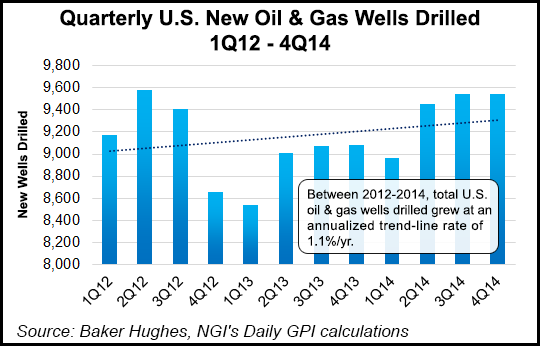BLM Frack Rule for Public, Tribal Lands Blocked by Wyoming Court
A federal judge in Wyoming on Tuesday night granted a request by four states, two industry groups and an Indian tribe to temporarily block Bureau of Land Management (BLM) rules governing hydraulic fracturing (fracking) on public and tribal lands from taking effect on Wednesday.

After nine hours of proceedings in his Casper, WY, courtroom on Tuesday, U.S. District Court Judge Scott Skavdahl granted a stay, but he told the plaintiffs that he didn’t have enough information to rule on their request for a preliminary injunction (PI) to block the rule. He gave the government until July 22 to enter the administrative record. A decision on a PI is expected in early- to mid-August.
Last March, Wyoming filed a lawsuit challenging the BLM’s authority to regulate fracking. The lawsuit was then joined by Colorado and North Dakota in April, followed by Utah earlier this month (see Shale Daily, June 18; April 28; April 16; March 26). Two industry groups, the Independent Petroleum Association of America (IPAA) and the Western Energy Alliance (WEA), filed a separate lawsuit in March (see Shale Daily, March 26).
Court records indicate that the two cases [Nos. 2:15-cv-00041-SWS and 2:15-cv-00043-SWS] have been consolidated, and the Ute Indian Tribe of the Uintah and Ouray Reservation has been added as a plaintiff.
Mark Barron, an attorney with BakerHostetler who argued for the IPAA and the WEA at the hearing, told NGI that it was too early to tell how Skavdahl would ultimately rule in August, but he said he is encouraged by how the proceedings have unfolded so far.
“He did find that the petitioners had established credible evidence of irreparable harm, so we feel that’s a positive finding,” Barron said Wednesday. “He also indicated that the balance of equities counseled for a PI because he felt that existing federal and state regulation was sufficient to protect the environment during the adjudication of the case. So really the remaining question is the likelihood of success on the merits.
“I felt that he was certainly engaging and listened to all the parties’ arguments. He was being careful in an excellent [and] very respectable way, and is going to take his time to make that decision. He was very clear with the parties that he thought it was a closed case. He didn’t want to give anybody a ‘blank check’ without the necessary information.”
Western state leaders have maintained all along that they can adequately regulate fracking, and that regulatory oversight should be spread over both private and adjoining public lands to avoid duplication and confusion.
“We appreciate the court is taking its time to carefully consider this important decision,” Wyoming Gov. Matt Mead said. “As I’ve said from the beginning of this process, Wyoming has rules in place for [fracking] and those rules work. The rules proposed by the [BLM] add no environmental benefit to Wyoming; they would only add another layer of unnecessary bureaucracy and cost to industry.”
WEA’s Kathleen Sgamma, vice president of government and public affairs, added that the BLM “was ill-prepared to implement an extremely complex rule in a short period of time.
“We highlighted how the BLM Washington [DC] office has not given sufficient guidance to the state and field offices that are implementing the rule, and as a result they were issuing confused instructions to companies on how to comply. The judge agreed that it makes no sense to implement an ill-conceived rule which could ultimately be overruled in court.”
Last week, the Southern Ute Indian Tribe filed a separate lawsuit in U.S. District Court for the District of Colorado over the BLM fracking rules (see Shale Daily, June 22). The tribe, based in southwest Colorado, had also sought a temporary restraining order to block the rule, but the court denied the motion on Monday.
On Tuesday, Chief Judge Marcia Krieger ordered the plaintiffs in the Southern Ute case to file an amended complaint within 48 hours, in accordance with the Administrative Procedures Act. Oral arguments were scheduled for a hearing on Oct. 14 in Durango, CO.
© 2024 Natural Gas Intelligence. All rights reserved.
ISSN © 1532-1231 | ISSN © 2577-9877 | ISSN © 1532-1266 |
